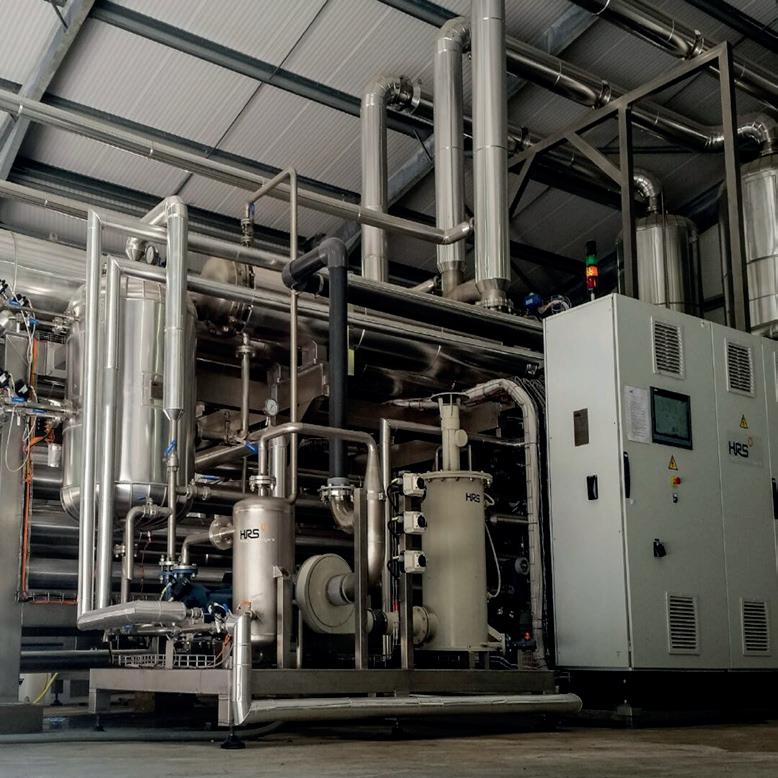







HRS offers pasteurization and concentration technology for the efficient management of digestate:
Digestate Pasteurization Systems (DPS):
Continuous three tank pasteurization of digestate with minimum energy investment.
Digestate Concentration Systems (DCS):
A system that can reduce the volume of digestate to 20%, or less, of its original volume.
Biogas Dehumidification Systems (BDS):
A system that removes water from biogas, protecting combined heat and power (CHP) engines from corrosion and cavitation. Solutions are tailored for each biogas plant. The DPS or DCS can be individually selected or combined, depending on several factors such as: suitable thermal energy, digestate use, waste volume. Our digestate management solutions offer the following advantages:
Digestate is efficiently pasteurized to ensure it can be used safely for fertilization.
Digestate volume is significantly reduced, lowering the cost of transporting digestate off-site.

Waste heat sources, such as heat from the CHP can be used as the energy source for both DPS and DCS processes.
DPS and DCS (or a combination of both) can convert digestate from a stream of waste to a value added product.
Our DTI heat exchangers offer reliable solutions and advantages for heating digesters:
High heat transfer
Long running times
No product blockage
Easy to clean
Larger surface area/ Smaller footprint
Eliminates fouling HRS DTI Series for Digester Heating

The HRS G Series is an ideal heat exchanger for cooling exhaust gases. The corrugated tubes can work with smaller heat transfer areas than traditional smooth tube heat exchangers. Our G Series units can be integrated and used to deliver thermal energy from the CHP units to our DPS and DCS systems.


HRS has developed a continuous digestate pasteurization process based on HRS DTI and DTR Series heat exchangers and a product holding section, for the destruction of pathogens.
The flow sheet below explains how the digestate is heated to its pasteurization temperature (normally 158ºF) using two DTI heat exchangers. The holding section consists of three tanks, with each tank holding the amount of product

to be processed within the holding period (normally one hour). The three tanks make it possible to constantly send and extract product from the holding section and recover energy between the hot pasteurized digestate and the cold incoming digestate.
Energy savings of up to 70% can be obtained compared to systems without heat recovery sections.
For different pasteurization criteria, HRS can provide solutions with up to three holding tanks, or holding tubes (less management time) for pasteurization systems with higher temperatures.
For fouling fluids, we can combine the DTI Series with our scraped surface heat exchangers offering a solution that reduces down time for cleaning.
Where required by legislation or quality demands to control pathogens in digestate (for example when treating animal by-products or producing digestate to the various global quality standards such as Class A Biosolids PAS110 and EC) pasteurization may be required at some stage during the anaerobic digestion process.




Evaporation is an efficient way of reducing the volume of digestate. Our evaporation systems raise the digestate temperature to its boiling point; water is evaporated and condensed, thus obtaining a concentrated end product and water. Forced recirculation: a pump sends the product through the evaporator at high velocity. This process ensures heat transfer remains high and the negative effects of fouling are limited.

Using the HRS K Series as an evaporator module for the evaporation of low viscosity digestate with reduced particle size. High heat transfer and good resistance against fouling.
Other Applications: Wastewater, brines and effluents with organic solids in low concentration and with low to medium viscosities.
Using the Unicus Series as an evaporator module for high fouling digestate with elevated viscosities. When concentrating to a high dry solid percentage the risk of fouling and high viscosity (low heat transfer) become apparent. For these applications, the patented Unicus is ideal due to its self-cleaning scraper action.
Other Applications: Effluents with high fouling risk and organic solids with high dry matter concentration.

These systems combine various evaporation stages. The vapor obtained from a previous stage is used as the thermal energy source for the resulting stage. Multiple stages can be combined to reduce the energy consumption needed for the amount of water evaporated.

Where possible we aim to integrate our evaporation systems with waste heat sources to achieve an effective sustainable process.
The HRS BDS Series is an efficient solution to cool and dehumidify biogas for combustion with two standard options. The system condenses up to 90% of the water contained in the gas, which is continuously separated before the clean biogas is ready for use. This is a necessary process for all bio-energy plants that use biogas as fuel in CHP engines.
A heat recovery step can be included as a standard option thus reducing energy costs up to 20%.
The BDS comes complete with controls in a packaged ‘plug and play’ skid.











HRS UK
+44 1923 545 625
HRS Spain
+34 968 676 157
HRS USA
+1 770 726 3540
HRS Malaysia
+60 3 8081 1898
HRS India
+91 20 2566 3581
HRS Australia
+61 3 9489 1866